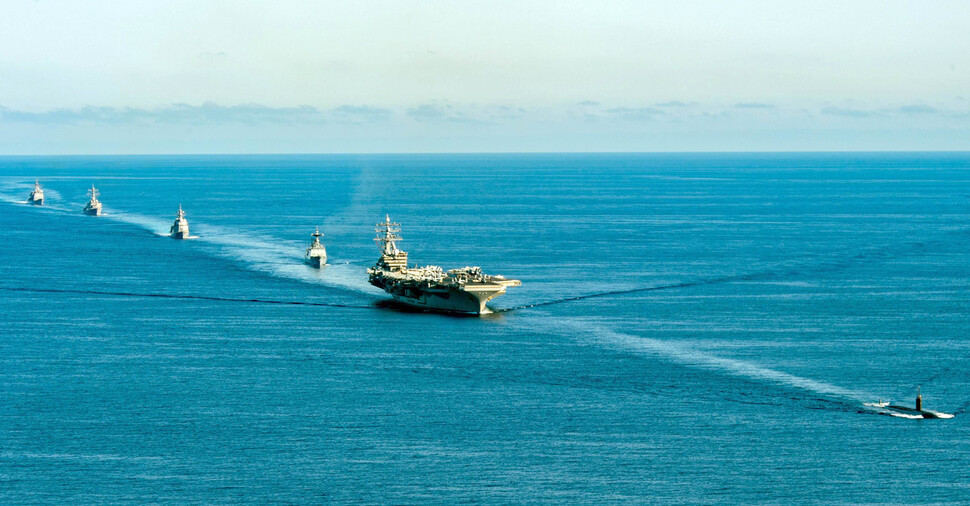hankyoreh
Links to other country sites 다른 나라 사이트 링크
[Editorial] S. Korea’s worrying trilateral exercises with Japan, US

South Korea, US and Japan are scheduled to conduct anti-submarine maritime drills in the East Sea on Friday. This marks the first time such trilateral drills are held in the East Sea in five years and six months, the last time being in April 2017.
Although it is true that the risk of a military threat coming from North Korea has heightened once more, it is worrisome that the South Korean government is hastening military cooperation with Japan despite various pending bilateral issues remaining unresolved.
South Korea’s Ministry of National Defense said Thursday that the exercises are part of its measures to “restore South Korea-US-Japan military cooperation to pre-2017 levels” in order to respond to North Korea’s nuclear and missile threats.
In addition, the ministry said the exercises were being pushed forward to “improve the search, identification and tracking capabilities of North Korean submarines that are capable of launching submarine-launched ballistic missiles.”
In other words, the new Seoul administration plans to continue strengthening security cooperation and holding trilateral military exercises going forward. As such, the current administration is undoing the policy line of its immediate predecessor, which held a cautious stance concerning trilateral military exercises involving the US and Japan.
Considering the advancements in North Korea’s nuclear weapons program, the North’s enactment of a recent law on the use of nuclear weapons, Pyongyang’s threat of preemptively using nukes to target South Korea, and South Korea’s proximity with North Korea, China, and Russia, there’s no doubt that South Korea needs to strengthen its security posture.
However, this does not mean that the South Korean government should rush into military cooperation with Japan, a highly sensitive issue, without consulting with the public and first receiving their consent.
Currently, there has still been no progress made to resolve various pending bilateral issues such as Japan’s wartime use of forced labor or Japan’s economic retaliation measures in recent years. Japan has likewise expressed no intention to apologize or provide reparations for its actions. Instead, Tokyo argues that it was South Korea that “violated international law.”
Given such a situation, how could the South Korean public accept such hastened military cooperation with Japan?
Also, a sense of increased vigilance and alertness is bound to rise as the exercises will be conducted in international waters in the East Sea, not too far from Dokdo, which Japan claims is its territory and has been trying to turn into a disputed area.
These exercises could mark an important turning point in line with the strengthening of trilateral military cooperation, something which the US has long been pushing for amidst its rivalry with China. In turn, such increased military cooperation could result in strengthening Japan’s overall military power.
Amid heightened US-China tensions over Taiwan, what principles and strategies South Korea will use to respond to current issues are becoming key questions concerning peace on the Korean Peninsula and in Northeast Asia.
During her visit to South Korea, Vice President Kamala Harris of the US met with President Yoon Suk-yeol on Thursday and emphasized trilateral cooperation between South Korea, the US and Japan and the improvement of South Korea-Japan relations while also discussing the “effort to preserve peace and stability in the Taiwan Strait,” according to the White House.
The more complicated and severe the situation is, the more important it is for Yoon and his diplomatic and security advisors to take into careful consideration the improvement of Seoul-Tokyo ties as well as the overall situation in Northeast Asia when deciding to proceed with trilateral cooperation involving the US and Japan.
Please direct questions or comments to [english@hani.co.kr]

Editorial・opinion
![[Column] Park Geun-hye déjà vu in Yoon Suk-yeol [Column] Park Geun-hye déjà vu in Yoon Suk-yeol](https://flexible.img.hani.co.kr/flexible/normal/500/300/imgdb/original/2024/0424/651713945113788.jpg) [Column] Park Geun-hye déjà vu in Yoon Suk-yeol
[Column] Park Geun-hye déjà vu in Yoon Suk-yeol![[Editorial] New weight of N. Korea’s nuclear threats makes dialogue all the more urgent [Editorial] New weight of N. Korea’s nuclear threats makes dialogue all the more urgent](https://flexible.img.hani.co.kr/flexible/normal/500/300/imgdb/original/2024/0424/7317139454662664.jpg) [Editorial] New weight of N. Korea’s nuclear threats makes dialogue all the more urgent
[Editorial] New weight of N. Korea’s nuclear threats makes dialogue all the more urgent- [Guest essay] The real reason Korea’s new right wants to dub Rhee a founding father
- [Column] ‘Choson’: Is it time we start referring to N. Korea in its own terms?
- [Editorial] Japan’s rewriting of history with Korea has gone too far
- [Column] The president’s questionable capacity for dialogue
- [Column] Are chaebol firms just pizza pies for families to divvy up as they please?
- [Column] Has Korea, too, crossed the Rubicon on China?
- [Correspondent’s column] In Japan’s alliance with US, echoes of its past alliances with UK
- [Editorial] Does Yoon think the Korean public is wrong?
Most viewed articles
- 1‘We must say no’: Seoul defense chief on Korean, USFK involvement in hypothetical Taiwan crisis
- 2N. Korean delegation’s trip to Iran shows how Pyongyang is leveraging ties with Moscow
- 3Amnesty notes ‘erosion’ of freedom of expression in Korea in annual human rights report
- 4‘Weddingflation’ breaks the bank for Korean couples-to-be
- 5[Reportage] On US campuses, student risk arrest as they call for divestment from Israel
- 6[Column] Park Geun-hye déjà vu in Yoon Suk-yeol
- 7Korea sees more deaths than births for 52nd consecutive month in February
- 8[Editorial] New weight of N. Korea’s nuclear threats makes dialogue all the more urgent
- 9Will NewJeans end up collateral damage in internal feud at K-pop juggernaut Hybe?
- 10[Guest essay] The real reason Korea’s new right wants to dub Rhee a founding father